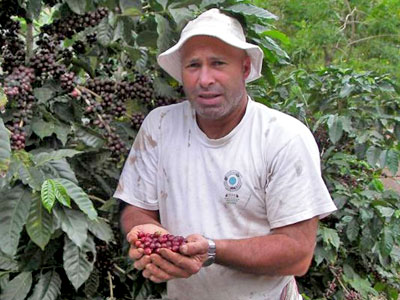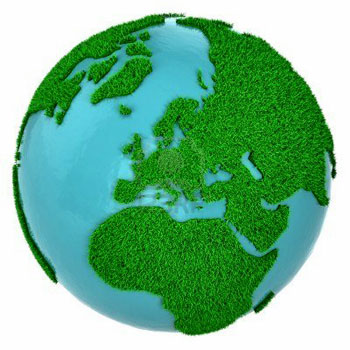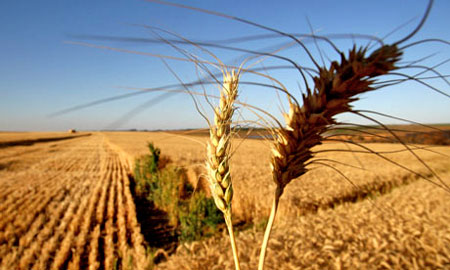
by Sarah Morrison
24 February 2013
from
TheIndependent Website
Small Producers Face Poverty
as Ever More Commodities are Controlled
by A Coterie of Multinationals
As you sip your morning coffee or tea,
accompanied perhaps by a chocolate biscuit, or a banana for the more
health-conscious, think hard about where your breakfast comes from.
Increasingly, a handful of multinationals are
tightening their grip on the commodity markets, with potentially dramatic
effects for consumers and food producers alike.
The livelihoods of millions of smallholders who produce the drinks and
snacks we consume every day are "seriously under threat", warns a report to
be published tomorrow to mark the start of Fairtraide Fortnight.
Extreme price volatility, high food prices and
more concentrated food markets threaten to leave farmers "condemned to
poverty".
Three companies now account for more than 40 per cent of global coffee
sales, eight companies control the supply of cocoa and chocolate, seven
control 85 per cent of tea production, five account for 75 per cent of the
world banana trade, and the largest six sugar traders account for about
two-thirds of world trade, according to the new publication from the
Fairtrade Foundation.
Such tight control of the markets by multinationals - which can use their
"buyer power" to dictate how the supply chain is run - can leave
smallholders "marginalized", surviving on precarious contracts, poverty
wages, and with poor health and safety practices, the report warns.
It stresses that, with the G8 summit to be held
in Northern Ireland in June, this is the year "to put the politics of food
on the public agenda and find better solutions to the insanity of our broken
food system".
More people may be shopping ethically - sales of Fairtrade cocoa grew by
more than 20 per cent last year to £153m - but, according to the report, the
world's food system is "dangerously out of control". Cocoa growers now
receive 3.5 to 6 per cent of the average retail value of a chocolate bar; in
the 1980s they got 18 per cent.
The report is being published to coincide with the launch of a three-year
food campaign by the Fairtrade Foundation, to,
"pull our broken food system back from the
brink and make it work for all".
Its recommendations include asking governments
to ensure greater transparency and "fair competition" in international
supply chains.
Michael Gidney, chief executive of the Fairtrade Foundation, said:
"Putting too much power into the hands of
too few companies increases the risk of exploitation in food supply
chains, where producers have no choice but to sell for low prices, while
consumers face a bewildering array of products on shop shelves even
though their purchases benefit only a small number of brands.
"Unless we do something now, millions of small farmers are condemned to
poverty. If they are in crisis, and farmers see no future in farming,
then many of our foods could be at risk."
About 500 million smallholders produce 70 per
cent of the world's food, but make up half the world's hungry. Women at are
the helm - producing 60 to 80 per cent of the food in developing countries
and acting as the main producers.
'Last year I got $2.20 per pound, this year
$1.40'
Gerardo Arias Camacho, 43, a coffee
farmer from Costa Rica, has been producing coffee since he was taken out of
school to help his father at the age of 10.

He works 13 hours a day to
produce coffee from five hectares.
Mr Camacho, a board member of the first
Fairtrade-certified co-op in his country, said this year he might struggle
to profit at all from some of the coffee he sells.
"About 40 per cent of our coffee is sold to
multinationals, but the problem with the free market is there is no
minimum price. Last year, I got $2.20 per pound of coffee; this year
it's about $1.40. This is really bad for us, as the cost of producing is
about $1.60.
"They really don't care about what problems we have here in our village;
we worry about having enough food, clothes, and enough money to send our
kids to school. Small roasting companies have direct relations with us,
know our needs and understand us. This makes a big difference."
Giant Multi-Nationals
...to
Dominate Food Production
by Mike Stones
from
FoodManufacture Website
Part 1
09 January 2012
The balance of power in global
food production is shifting away from national governments
to multi-national firms and from western economies to
emerging nations, warns a new report from SAC’s Rural Policy
Centre.
In the first of a two-part
series, we focus on the growing power of trans-national

The balance of food
production power
is shifting from governments
to trans national corporations
“Consolidation of TNCs has seen some shifting of the focus of power
from governments and supra-national bodies towards corporate
business,” according to the report Power in Agriculture.
In parallel, state intervention in agriculture
and the supply chain, particularly in the EU, is diminishing.
Speaking at the Oxford Farming Conference, whose organizers commissioned the
report, one of its authors Dr Alan Renwick, said:
“TNCs are becoming increasingly dominant in
all aspects of the supply chain.”
For example, four firms control more than 75% to
90% of the international grain trade.
Also, just 10 firms are responsible for 40% of the global retail market.
Annual turnover
Top TNC, ranked by annual turnover, was identified as the Swiss-based firm
Nestlé with a turnover of more than $112bn.
Archer-Daniels-Midland (ADM) and Unilever were ranked second and third with
annual sales of $62bn and $59bn respectively. Total revenue from the global
food products industry, consisting of agricultural products and packaged
foods, was estimated at $3.2 trillion in 2008.
Responding to the report, Caroline Spelman, secretary of state for
the Department for Environment, Food and Rural Affairs, acknowledged that
the UK is home to,
“some of the world’s most successful and
influential agri-food corporations.
I’m thinking of Unilever, Tesco and
Associated British Foods. The UK government understands the power of
these organizations and how vital they are in building a sustainable
food system and a green and growing global economy.”
Spelman added that the government understands
its role in ensuring that corporations use their power positively.
“We’re taking steps, including the
introduction of a groceries code adjudicator, to safeguard it."
“We also know that these corporations
provide the bridgehead to emerging economies for our [food] and farming
industry.”
But not all speakers shared her view of the
benign impact of TNCs.
Andrew Blenkiron, estate director of
large-scale food producer Euston Estates, warned of the near unfettered
power that TNCs now wield.
“The influence of TNCs is hyper political
with many having a turnover many times the GDP [gross domestic product]
of numerous small nations… They probably make even more from the greed
that is ‘the market trader".
“No longer is the true supply and demand equation relevant; trade is
rampant on rumour and conjecture. There is no doubt that volatility in
the food supply chain has served to further increase TNC’s influence and
power.”
Tony Hehir, Australian organic dairy
farmer, warned that his country’s grains, pork and tomato industries are
already dominated by TNCs.
Without consequence
"TNCs are now firmly entrenched in the
grains industry. Grain farmers are now disadvantaged by delivery
contracts with penalties for non compliance by the producer, yet
absolute discretion without consequence for the TNC buyer.
Power has shifted very rapidly from the producer since the advent of TNC
domination of this industry.”
Part 2
Food Production Power to Shift East
10 January 2012
The EU could lose out as the
power in global agricultural production increasingly
shifts east, according to a new report from the SAC’s
(Scottish Agricultural Centre's) Rural Policy Centre.
In the second of our
two-part series, we examine the growing dominance of
Brazil, Russia, India and China (BRIC nations).

The balance of power in
global farm production
will gradually shift east
While North America and EU countries currently dominate food production,
power will shift to BRIC nations, warns the report, titled Power in
Agriculture.
“The EU has retreated from world markets as
policies have changed [from boosting production to environmental
management].
“The export capabilities of the EU in some key commodity sectors are
predicted to decline further in the next 10 years unless policy
conditions change markedly,” warns the report.
Increasing pressure
In the coming decades, EU countries will face increasing pressure to allow
greater access to their markets.
“This competition is likely to come from
emerging nations - like China, India and Brazil - and will have
implications for producers,” said the report.
Two factors are likely to speed the process.
-
First, the opening up of agricultural
markets through a gradual process of trade liberalization and
deregulation.
-
Second, the increasing globalization and
concentration of the agricultural supply trade.
Moreover, some emerging nations have a strategic
advantage in possessing key natural resources.
“Our analysis shows a potentially grim
picture for many of today’s powerful agricultural economies, including
the US and Europe.
“In particular, European countries - including the UK - appear to be
relatively poorly endowed in global terms with critical natural
resources used in agriculture - such as land, water, potassium,
phosphate, oil and natural gas,” according to the report.
Climate change is expected to exacerbate some of
these changes.
Many emerging nations, such as Brazil, China and Russia, are better placed
in terms of water and energy endowments but are vulnerable in terms of their
possession of arable lands.
This accounts for some large economies,
particularly China, resorting to what the authors term ‘land-grabbing’ in
Asia.
Unlikely to be
sustainable
The report’s authors draw three main conclusions:
-
EU countries will face competition for
land from countries such as China.
-
Water-, energy- and fertilizer-intensive
agricultural production systems are unlikely to be sustainable in
the near future.
-
EU countries need to balance their
general level of agricultural efficiency - particularly in water
use.
Speaking at the Oxford Farming Conference,
Caroline Spelman, secretary of state for the Department for
Environment, Food and Rural Affairs, said:
“I read this as a call to the EU farming
industry to become competitive - and grasp the many opportunities of
globalization and the need for sustainability.”
Terry Hehir, Australian organic dairy
farmer, warned the conference that:
“Land [in Australia] is already being
procured in vast amounts by foreign countries to secure future food
supplies.”
The Qatar government has already bought
170,000ha of Australian farmland, he added. It plans further investment to
supply up to 35% of Qatar’s food supply from these farms.
Meanwhile, Brazilian agricultural exports soared by 24% last year to reach
$94.6bn compared with the previous year. Agriculture minister Jorge
Ribeiro has identified a target of $100bn for this year.
The biggest importer of Brazilian food was China, which accounted for
$16.5bn of purchases.
The Global Food Crisis
- ABCD of Food or How The Multinationals
Dominate Trade -
by Felicity Lawrence
2 June 2011
from
TheGuardian Website
Wherever you live,
you can't avoid the four global giants

Wheat stands in a field in
Brazil waiting to be harvested.
Photograph: Adriano
Machado/Bloomberg via Getty Images
By mid-morning snack you will certainly have
encountered their products several times already wherever you are in the
world, whether it is the corn in your flakes, the wheat in your bread, the
orange in your juice, the sugar in your jam, the chocolate on your biscuit,
the coffee in your cup.
By the end of the day, if you've eaten beef,
chicken or pork, consumed anything containing salt, gums, starches, gluten,
sweeteners, or fats, or bought a ready meal or a takeaway, they will have
shaped your consumption even further.
And yet, the four giant transnationals that dominate the raw
materials of the global food system have largely stayed below the radar of
European consumers.
Known as the 'ABCD Group' for the alphabetic
convenience of their initials,
...account for between 75% and 90% of the global
grain trade, according to estimates.
Figures cannot be given with confidence,
however, because two of the companies are privately owned and do not give
out market shares.
This extraordinary concentration of power and money in the global food trade
has been identified by Oxfam in a new report this week as one of the
structural flaws of the system. At each stage a handful of players dominate,
not just in primary agriculture but in food manufacturing and retailing.
The result, according to Oxfam, is that,
"they extract much of the value along the
chain, while costs and risks cascade down on to the weakest
participants, generally the farmers and labourers at the bottom".
Oxfam is the latest in a long line of critics to
highlight this corporate concentration as a root cause of hunger and
poverty.
The ABCD group have said they welcome informed
debate but that, as far as they are concerned, their operations are the
vital waters that keep food and its finance flowing from those who can grow
it to those who need to consume it. Scale enables them to be highly
efficient.
The grain trade is capital intensive; they
invest heavily in storage facilities and port and transport infrastructure.
-
US-based
Cargill with the highest revenues,
is the largest private company in the world - and famous for its
secrecy. Its headquarters is a mock-Tudor meets mock-French chateau
in Minnetonka in the US mid-west, where the company was founded by a
family of grain traders in 1865.
Today, it is still majority-owned by
descendents of the family. Its main commodity trading operation is
run out of the tax haven of Switzerland. Its sales were $108bn in
2010, and $115bn in 2009, and its net earnings were nearly $6bn for
those two years.
As well as being a leading player in the trading, processing and
transporting of the most important agricultural commodities,
fertilizer and meats, it is one of the world largest hedge funds.
When Gordon Brown, as prime
minister, called a summit in London on the 2008 food crisis, Cargill
was invited.
When Walker crisps had an image problem
with the saturated fats in its crisps, Cargill came to the rescue,
having a large acreage of land in eastern Europe planted with a new
variety of "Sunseed".
It produces about half of all McDonald's chicken products across
Europe. It sells fats to Unilever.
When the US needed to appoint someone to
lead the reconstruction of agriculture in Iraq, it turned to former
Cargill executive Dan Amstutz. In China, where it has a joint
venture with
Monsanto, to whom it sold its
enormous seeds interests a decade ago, it has trained over 2 million
farmers in the American way of agriculture.
Over that same decade, Cargill, ADM and Bunge are thought to have
acquired about 80% of China's soya processing capacity. More
recently, Cargill has been moving up the food chain into high-value,
hi-tech additives and what it calls food solutions for the
manufacturing industry.
-
Louis Dreyfus, established in 1851,
is also private and still family owned, headquartered in Paris but
again trading largely out of Switzerland.
It gives no figures and never comments
to the media, but its estimated revenues in 2009 were £34bn. It has
enormous grain, sugar and energy trading interests around the world,
although in recent years it has concentrated on financial aspects of
commodity trading.
-
Bunge, which expanded through the
late 19th century as a grain trader in South America, is
now incorporated in the tax haven of Bermuda but its headquarters
are in the US. Its net revenues in 2010 were $47bn, and net earnings
were $2.3bn. It is a leading processor of oilseeds, and producer and
trader of grains, sugar and bioenergy. It is also a key player in
the global fertilizer market.
-
ADM, or Archer Daniels Midland, is
incorporated in the US tax-haven state of Delaware and headquartered
in Illinois. Its revenues in 2010 were $62bn and its earnings were
$1.9bn.
ADM's origins go back to a US seed crushing business begun in 1902.
Today, it has vast interests in trading,
processing and transporting soya and other oilseeds, and corn, wheat
cocoa and other agricultural commodities. It is a leading
manufacturer of oils, corn sweeteners, flour, biofuels, food
additives from gums to gluten, soya isolates and animal feed
ingredients.
To add to the concentration, Cargill, ADM, and Bunge have strategic
alliances and joint ventures with the seed and agrochemical companies that
dominate the agricultural inputs part of the global food system.
In seeds four firms,
-
Monsanto (incorporated in Delaware, HQ
in Missouri)
-
Dupont (incorporated and HQ in Delaware)
-
Syngenta (incorporated and HQ in
Switzerland)
-
Limagrain, a French-based international
co-operative,
...account for over 50% of global seed sales.
In agrochemicals six firms,
-
DuPont
-
Monsanto
-
Syngenta
-
Dow (incorporated in Delaware, HQ in
Michigan)
-
German chemical giants Bayer and BASF,
...control 75% of the market.




